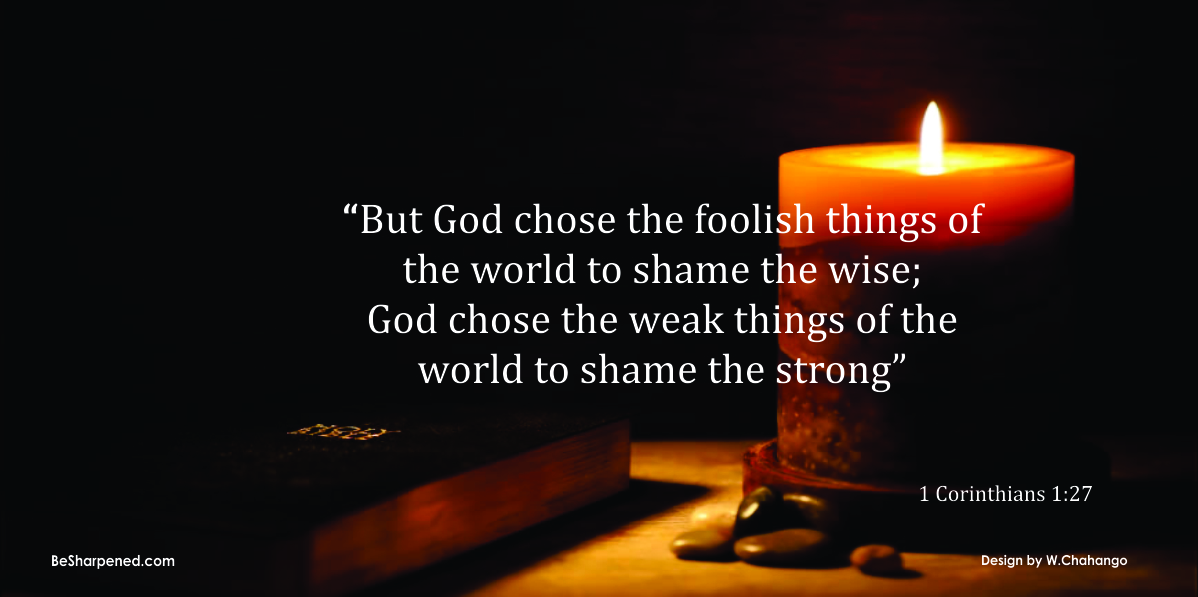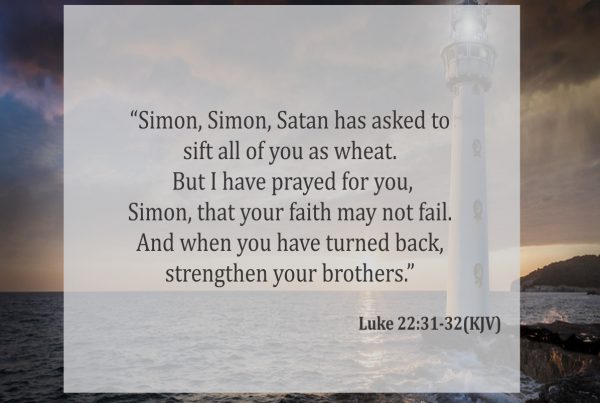”26 Brothers and sisters, think of what you were when you were called. Not many of you were wise by human standards; not many were influential; not many were of noble birth. 27 But God chose the foolish things of the world to shame the wise; God chose the weak things of the world to shame the strong. 28 God chose the lowly things of this world and the despised things—and the things that are not—to nullify the things that are, 29 so that no one may boast before him. 30 It is because of him that you are in Christ Jesus, who has become for us wisdom from God—that is, our righteousness, holiness and redemption. 31 Therefore, as it is written: “Let the one who boasts boast in the Lord.”
1 Corinthians 1:26-31New International Version (NIV)
The Cracked Pot: A Story for Anyone Who’s Forgotten How They Were When They Were Called
There was a woman who had two large pots. She hung each on the ends of a pole which she carried across her neck.
One …
One of the pots had a crack in it while the other didn’t. The perfect pot always delivered a full portion of water at the end of the long walk from the river to the mistress’ house. The cracked pot always arrived only half full.
Every day, for two years, this continued. And the water bearer delivered only one and a half pots full of water.
The perfect pot was proud of its accomplishments. But the poor cracked pot was ashamed of its own imperfection. It was miserable that it was only able to accomplish half of what it had been made to do.
Ashamed?
One day, after the two years of what it perceived to be a bitter failure, it spoke to the water bearer by the river saying “I am ashamed of myself, and I want to apologize to you.”
Why?” asked the bearer. “What are you ashamed of?”
“I have been able to deliver only half my load for these past two years because of this crack in my side that causes water to leak out all the way back to your mistress’ house. Because of my flaw, you have not gotten full value from your efforts,” the pot said.
Notice …
The water bearer felt sorry for the old cracked pot, and in her compassion she said, “As we return to the mistress’ house, I want you to notice the beautiful flowers along the path.”
Indeed, as they went up the hill, the old cracked pot took notice of the beautiful wild flowers being warmed by the sun on the side of the path. This cheered it a bit.
But at the end of the trek, it still felt bad because it had leaked out half its load, and so again it apologized to the bearer for its failure.
The bearer said to the pot, “Did you notice that there were flowers only on your side of the path, but not on the other pot’s side?
The advantage in the flaw
“That’s because I have always known about your flaw, and I took advantage of it. I planted flower seeds on your side of the path, and every day while we walk back from the stream, you’ve watered them.
“For two years I have been able to pick these beautiful flowers to decorate my mistress’ table. Without you being just the way you are, she would not have this beauty to grace her house.”
Upside down
Are you the person who exalts human competencies and cleverness? Thus, you are living under the illusion that God needs greatness?
Such a thinking, worldly in pattern, is not only contrary to the gospel, it’s an illusion. At the cross of Christ, God turned the world’s wisdom upside down. The Jews and Greeks at Corinth couldn’t understand how He provided salvation (redemption) through a crucified man as opposed to a conquering king (Acts 1:6-8). Paul actually put it this way in 1 Corinthians 1:22-23: “Jews demand signs and Greeks look for wisdom, but we preach Christ crucified: a stumbling block to Jews and foolishness to Gentiles”. In addition, Luke writes “When they saw the courage of Peter and John and realized that they were unschooled, ordinary men, they were astonished and they took note that these men had been with Jesus” in Luke 4:13.
The Church at Corinth
“Paul’s statement in 1 Corinthians 1:26 makes clear that the majority of church members were socially humble (some were slaves: see 1 Corinthians 7:21-23). Paul also implies that some members were wise, powerful, and even of noble birth (1 Corinthians 1:26). The terms he uses had a fairly wide socioeconomic range and so do not necessarily point to the presence of the elite within the church, but they do indicate that a small number of congregants were somewhat more privileged than the others. Among this higher-status group was almost certainly Erastus, “the city treasurer,” who sends greetings from Corinth in Paul’s later letter to his community in Rome (Romans 16:23).”
Edward Adams, "Church at Corinth", n.p. [cited 2 Mar 2020]. Online: https://www.bibleodyssey.org:443/en/places/related-articles/church-at-corinth
God’s standard
God is not in need of one’s greatness – influence or fame or popularity. These are the things that men look for and approve others for. However, our standards are not God’s.
Now, this does not mean that God does not often choose and use people of status and stature as well. He does, but only, remarkably enough, when they have learned that their usefulness does not derive from their position or their abilities, but rather from his presence in their lives.
God, therefore, works despite you, not because of you. Who you are and what you bring to the table doesn’t really help God out. Like Moses discovered (Exodus 4:10-17), nothing can commend you to God. Moses had thought that God needed eloquence of speech. But God insisted on doing His work through him anyway.
God chooses the weak and foolish to shame the contrary
God chooses whomever He wills, “unpromising” as they may seem, to do His work (Ephesians 2:8-9 and 2 Timothy 1:9). Thereafter, He grows us from nothing to something. Mark you, to the Greeks, to be called a nothing was the worst insult. It meant to lack being. This is why Paul wants you to realize who you are before God. You are nothing (Matthew 11:11). There’s nothing that commends you to God. He did this to shut the mouth of the world (vv. 27-28).
God chooses the despised, foolish and weak to be His servants
Consider how “foolishly” God chose David to fight the giant Goliath. David was just a young boy when God called him. He was so young in age and immature in physical development that the Bible says, “He looked David over and saw that he was little more than a boy, glowing with health and handsome, and he despised him” (1 Samuel 17:42). Goliath took it as a joke when he saw who had been sent to fight with him. The giant couldn’t help it but laugh when he saw whom God had chosen!
Therefore, God chooses the despised, foolish and weak to be His servants. In doing this, He confounds the mighty, proves His power and reveals who He is. In light of this, there can be no boasting.
Boasting can only be in God
We can only boast in God because we are nothing. In case that you want to compare yourself to others, you’ll discover that there’s always someone better. The something that you are is so that you can boast about God.
Therefore, if you must boast, then look back at where God has brought you from. And if you must envy where others are, then first find out where God has brought them from.
Prayer
Lord God, who works through the weak and foolish things of the world to shame the strong and wise; You who chooses the lowly things, the despised things—the things that are not—to nullify the things that are; my goal is to boast in You. So I make myself available to You, even with my weaknesses. May what You have said of and planned for me become reality in my life. In Jesus’ Name I pray. Amen.
Additional Resources (on God chooses)





